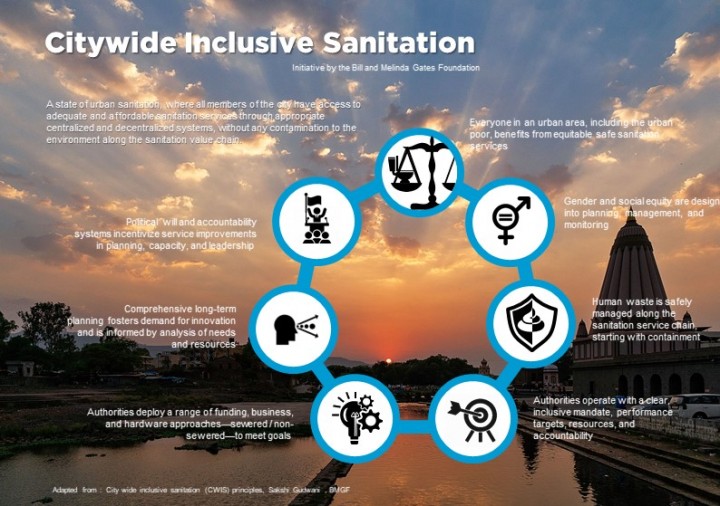Wai - Citywide Inclusive Sanitation
2018 - 2022 • Center for Water and Sanitation, CRDF, CEPT University
Purpose
To demonstrate an approach for achieving citywide inclusive sanitation services across the service chain and moving towards ODF+ and ODF++ in small and medium towns in India by supporting Wai municipality.
Activities
Small and medium towns in India (100,000 in population) have nearly 40% of India’s urban population. While there are large gaps in sanitation across urban India, these gaps are more pronounced in the small and medium towns. This project supports one town in the Indian state of Maharashtra – Wai, to demonstrate a viable approach to provide citywide inclusive sanitation. Wai acts as a “laboratory” to test approaches that can be applied to other small and medium towns, as well as to underserved areas in larger towns in the state of Maharashtra and in other States in India.
The City-Wide Inclusive Sanitation (C-WIS) project for Wai monitors the quality of ODF+ service delivery, with special attention to urban poor and women, strengthen the city systems to ensure sustainability of these services beyond the project period and generate lessons that motivate and inform state actors to facilitate replication of Wai across the state.
Following are the activities that are being undertaken in this project:
Creating an enabling environment for FSSM in Wai Municipal council, under which CWAS provides support to Chief Officer, elected representatives and officials from sanitation department who have the responsibility of planning and monitoring of FSSM services. The support is to enable them to be accountable and to ensure that the FSSM services are safe and inclusive. This includes activities related identifying measures to ensure financial sustainability for FSSM services.
Support is provided to Wai council to move towards ODF++, to take up interventions such as: increasing individual toilet coverage, monitoring FSSM activities, reuse of treated wastewater /septage and reviewing their plan for grey-water management.
Activities are taken up with WMC to ensure that planning and delivery of sanitation services are inclusive. This is achieved by ensuring that sanitation services reach all communities, including the low-income settlements. Also interventions are taken up to ensure regular usage, replacement and monitoring of PPEs by sanitation workers. User centric and gender sensitive design of sanitation facilities and service/management approaches are being explored.
* A city is classified as ODF+ when not a single person is found defecating or urinating in the open and all community toilets and urinals are functional and well maintained.
** A city is classified as ODF++ when it has achieved ODF+ and its faecal sludge, septage and sewage is safely managed and treated with no discharging in open areas.
Images

Image: CityWide Inclusive Sanitation principles to be implemented in Wai
Countries of activity
Location of main activity
Objectives
1. To ensure an enabling environment for FSSM in Wai by working towards institutionalization of FSSM within city government operations. Support is provided to those responsible for planning and monitoring of FSSM services to ensure that FSSM services are safe and inclusive.
2. To support Wai Municipal Council in operationalizing and sustaining its ODF+ status by continuing to assist in taking up interventions while also reviewing the city’s plan to advance towards ODF++.
3. To ensure that the Municipal Council’s planning and delivery of sanitation services were inclusive and reach all communities and promoting a user centric and gender sensitive design of sanitation facilities and service approaches.
4. Documentation and dissemination of the experiences of Wai on moving from ODF to ODF++ across Maharashtra , other States in India as well as from elsewhere in Asia and Africa.
Further information
Partners include Wai Municipal council, Government of Maharashtra, Bill and Melinda Gates foundation
Videos
Citywide Inclusive Sanitation Model in Wai
Wai city demonstrates citywide inclusive sanitation with support of Center for Water and Sanitation, CRDF, CEPT University.
Contact information
Dr. Meera Mehta
Login to see the e-mail-adress of the contact person.
Dr. Dinesh Mehta
Login to see the e-mail-adress of the contact person.
CWAS, CRDF, CEPT University
Login to see the e-mail-adress of the contact person.
Filter tags
Behaviour change Bill & Melinda Gates Foundation Capacity development Cities Community sanitation East Asia & Pacific Educators Emptying and transport (non sewered) Enabling environment and institutional strengthening Faecal sludge treatment processes Faeces or faecal sludge Global Greywater or wastewater Health and hygiene Journalists Operation, maintenance and sustainable services Political processes and institutional aspects Politicians and local decision makers Practitioners Public awareness, advocacy and civil society engagement Resource recovery Toilets or urinals (user interface) Treatment of faecal sludge Treatment of wastewater or greywater University, education or research institution Urban (entire city) Urban informal settlements (slums)
Attached files
Links
Center for Water and Sanitation, CRDF, CEPT University
Ahmedabad
India
Uploaded by:
Center for Water and Sanitation CRDF, CEPT University (CWASCEPT)
















